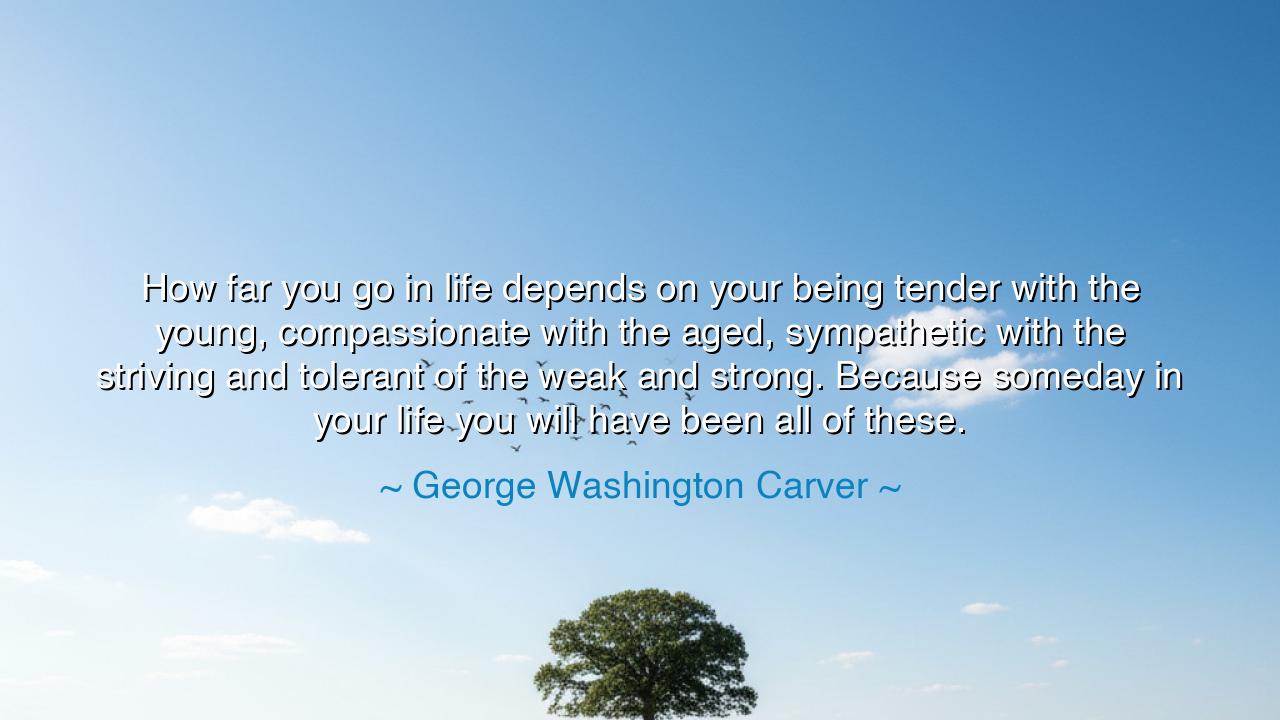
How far you go in life depends on your being tender with the
How far you go in life depends on your being tender with the young, compassionate with the aged, sympathetic with the striving and tolerant of the weak and strong. Because someday in your life you will have been all of these.






“How far you go in life depends on your being tender with the young, compassionate with the aged, sympathetic with the striving and tolerant of the weak and strong. Because someday in your life you will have been all of these.” Thus spoke George Washington Carver, the humble sage of Tuskegee, whose wisdom bloomed from both hardship and grace. In these words, he reveals the secret of true greatness — that the measure of a life is not found in power or wealth, but in kindness. For all men, no matter how high they rise or how far they wander, walk the same circle of existence: they are born in weakness, grow in struggle, age in weariness, and one day must lean upon the compassion of others.
Carver, born into slavery and raised amid the cruelties of ignorance and poverty, was no stranger to suffering. Yet he did not become hardened by it; rather, he was refined like gold in the fire. His life was a living sermon of gentleness and humility, and his faith in the goodness of humanity shone through every word he spoke. In this quote, he distills the wisdom of a soul who has seen both the worst and the best of mankind. He teaches that the heart which remains tender — even in a harsh world — is the one that truly endures. Tenderness, compassion, sympathy, and tolerance are not weaknesses, but the very forces that sustain the human spirit.
To be tender with the young is to nurture the dawn of life, for every child carries within them the seeds of tomorrow’s world. The one who speaks with patience to a child speaks to the future itself. To be compassionate with the aged is to honor the evening of life, to remember that every wrinkle carries a story, and every slow step once walked swiftly for the good of others. To be sympathetic with the striving is to stand beside those who struggle uphill, for their effort mirrors the trials of our own youth. And to be tolerant of both the weak and the strong is to recognize that both are bound by the same fragile thread of mortality — the weak may one day grow strong, and the strong may one day stumble. Thus, Carver calls us to humility, for in time we shall wear all these faces.
Consider the life of Nelson Mandela, who spent twenty-seven years imprisoned and emerged without bitterness, preaching forgiveness instead of vengeance. He was tender toward the young, building schools for children; compassionate toward the aged, honoring the wisdom of his elders; sympathetic to those still struggling under oppression; and tolerant even of his enemies, knowing that hatred only deepens chains. His greatness was not born of power, but of understanding, of knowing that the human journey is shared by all. He had lived through weakness, striving, and strength — and so he embraced the world with gentleness. In him, Carver’s words found living form.
Carver’s message is more than moral advice; it is a universal truth. Life, he reminds us, is not a straight path but a wheel that turns. Today’s youth will be tomorrow’s elder; the strong may fall, and the weak may rise. The proud heart forgets this truth, and so becomes cruel. But the wise heart, remembering the wheel’s turning, walks softly and treats others with mercy. When we look at another — a child, an old man, a beggar, a ruler — we are, in some measure, looking at ourselves in another season of time. Empathy, then, is not a virtue of the sentimental; it is the recognition of shared destiny.
And this is why Carver’s teaching remains as radiant now as when he first spoke it. For though he was a man of science, uncovering the mysteries of plants and soil, he was also a man of the spirit, understanding that the greatest cultivation is not of crops, but of character. His quote teaches us that success without compassion is hollow, and that a life lived for self alone is barren ground. To go far in life, one must not only strive with intelligence, but walk with gentleness. For when the years have taken our strength, it is not our achievements that will comfort us — it is the kindness we gave and received.
So, my child, let these words be written upon your heart: Be tender. Be compassionate. Be sympathetic. Be tolerant. Do not measure success by how high you climb, but by how softly you tread on those beneath you. Speak kindly to the young, for you were once like them; listen gently to the old, for you will become them; encourage the striving, for their struggle is your own; and show mercy to the weak and the strong alike, for both are mirrors of your humanity.
In the end, Carver’s wisdom calls us to live not as conquerors, but as caretakers of one another’s hearts. The greatness of a life is not in how loudly it is remembered, but in how deeply it has touched others. To live with tenderness and compassion is to walk the eternal path of love — and those who walk it, though they may leave no monuments of stone, will leave a legacy written upon the soul of the world.






AAdministratorAdministrator
Welcome, honored guests. Please leave a comment, we will respond soon